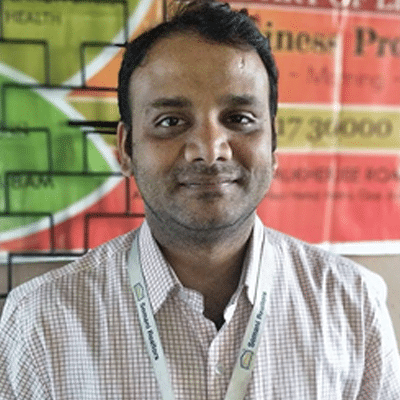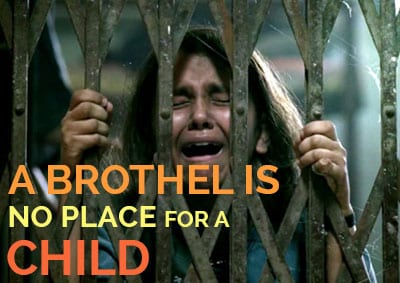Born from a very poignant moment of truth that Sonagachi is for him, Acharjee has been working relentlessly towards building a future for the kids of sex workers, child sex workers, and at-risk children. Over 25,000 people have benefited from the work he is doing with the support of his NGO. There is also a residential school coming up soon for daughters of sex workers at Joka, Kolkata.
‘They should have a stake in their future,’ said Acharjee.
Arnab Acharjee, an IT manager for the last 13 years, heads Project Udaan, an Art of Living and Overseas Volunteer for a Better India initiative for rehabilitating the children of sex workers in Sonagachi that houses several hundred brothels and over 12,000 sex workers.

Acharjee has been running a makeshift tutorial evening school there. Working in an area like Sonagachi since 2012, Acharjee’s problems were multifold. With mothers engaged in the profession, especially in the evenings, children were left to themselves, sometimes even kicked out of their houses. These children eventually became vulnerable to drugs. What these children did with their time, was very crucial to make sure they did not harm themselves in the near or distant future and that they had a chance. Another problem was and continues to be, to convince parents about educating their girl children. The tendency among many parents is to bring them back into the profession. This problem is far more complicated than it looks to be and is understood better by none other than people like Acharjee.
“There was strong resistance from the families and lack of trust in us. We struggled to bring a change in the thought process and create a need for them to change. Some families want to keep their daughters in the profession. Some of them are not very keen that their daughters get educated and go somewhere else because that simply means less income. It’s a very small world for them there, where the education is seen as excess,” says Acharjee. “So, we had to go from door to door and cajole them a lot to make them send their children to our education center,” he said.
Some of the initiatives Acharjee is leading in the area include:
- 5 days a week medical camps
- Free Medicines
- Tutorial school for kids
- Health and hygiene awareness drives
- Yoga and meditation camps for capacity building
- Chanting and singing
- Vocational counseling
- Parent counseling
- HIV clinic
- Rehabilitation initiative for addicted
- More than 25, 000 beneficiaries
“Over the years, people of Sonagachi have started relating to us and now we get requests to arrange more of these musical, yoga and meditation programs because these bring them immense relief from the day to day rigor where they are physically exploited every single day’ Acharjee said, “Lot of NGOs provide material relief to some extent or even counseling, fight for rights, but no other initiative has the holistic approach that includes spiritual, material and mental relief. Their mental health and spiritual well-being cannot be ignored.”
Acharjee is leading the construction of a fully residential school for girls in Pailan slated for opening by mid-2018. “Apart from education, we will also focus on vocational training. In fact, I want to make sure that every student of the school gets gainful employment,” Acharjee said.
But a question that implores me is, how has Acharjee come to get involved in this tricky area of Sonagachi, so dangerous to navigate since intentions are always suspect.
“One day, while surveying Sonagachi, we went to a house. I got talking to the couple and their child when a customer walked in. The woman left the conversation and went to the next room to see the client. All this happened in front of the husband and child. That image is frozen in my mind. A strong sense of wrong arose in me. My dominant feeling was that no child should have to see this, day in and day out,” Acharjee explained.

His first brush with the locals while discussing the idea to start a school was met with sufficient mistrust and lack of will.
“The first time we went to Sonagachi, it was tough. The people there did not trust us at all and did not want us to open a school. They thought of us as just another NGO out to get something out of them. There were oppositions from brothel managers and sex workers alike,” said Acharjee, “But we were determined to get to the kids.”
Acharjee started with free medical camps in the area. The people welcomed the move and benefitted from these 5-day camps. The owner of a medical manufacturing company came to know of this and offered to supply medicines to Acharjee at dirt cheap prices.
“The people there in Sonagachi then gradually started trusting us, opening up to us and many of them started sharing that they did want a better future for their kids,” Acharjee said, “They had compulsions and they were walking a tightrope. We then got together some kids. We made them learn some yoga, meditation, singing and showed them that life could get better.”
Acharjee was surprised to discover what came next.
“We saw that these kids were immensely talented, and with some nurturing and guidance they could do very well in their lives,” he said, “Most of them said that they wanted to become teachers, doctors and some wanted to be dancers.”
Acharjee started a small education center in collaboration with a local club. With 50 odd kids, children get together every day to study, play and learn new things. Before the center started, this would be the time children would go out and smoke up and engage in dubious activities. The makeshift school acted as a shelter for them in the evenings. Acharjee also has had to send some of these children to The Art of Living rehabilitation center to receive treatment for drug addiction. These kids are back and their parents could not be more grateful to Acharjee’s work.
But there is one story that Acharjee remembers with some pride.
“We had this 7-year-old kid who did not speak with anyone. She was going through substantial trauma when she came to us. She stayed isolated and would not utter a word. But once she started coming to the center and undergoing some capacity-building measures, she started opening up,” Acharjee said, “ Today she is a good public speaker! She welcomes the guests who come to the center. She is a different child now, more open and free.”
While Acharjee is a role model to 50 odd kids, who is his role model?
“I am led by Gurudev Sri Sri Ravi Shankar’s message of ‘Smile and Serve’. You cannot lose your peace of mind while serving others. We often see social activists are agitated and angry about issues. But you are just burning yourself up faster in that process. His vision and guidance to uplift people is a compelling force in my life. My days begin with meditation and spiritual practice called Sudarshan Kriya. I need and use the calmness and mental strength for the kind of work we do. What he has taught has been so useful to me!”
Acharjee has also found support for his work from West Bengal government and Partho Chatterjee, Minister of Education, West Bengal along with Sri Sri Ravi Shankar, Founder of The Art of Living laid the foundation stone for the residential school for girl children.
There are three types of sex workers and there is a class system prevalent too- For one kind, it is a high scale profession, the second kind, comes into it through trafficking, and some are in it to earn income pushed into it by poverty.
“There is a lot of negativity there and people are using them (sex workers) all the time. There are plenty of NGOs there that get funds from the government but they are not doing much for the upliftment of the children who are growing up in the shadows of this trade,” Acharjee said. It is perhaps the fact that one must deal with this strenuous negativity, stress, and difficulty of functioning in an unorganized and illegal sector that makes Art of Living’s and Acharjee’s work much more relevant.
“The greatest difficulty was – starting something at all. The opposition was so strong that we had to shut the center for 4-5 months initially. But we simply didn’t have the option of giving up because the future of these children was at stake here,” Acharjee said.
Acharjee has the unflinching support of his wife and mother. He leaves home at 6 am and only returns at 10, after finishing his day job and taking care of the kids. “Well, it is only due to their support that I am able to manage my schedule and move ahead in my mission.”
Occasionally, lack of support from the families that he is helping creates difficulty for him.
“It is very difficult at times to make them believe that there is a better world out there, one with far more opportunities and that their kids need not stay in this profession. I understand their situation.”
The 11-year-old Sonali Das(name changed) feels loved and cared for at the center. “I used slangs and bad language before. I am doing well in my studies here. But I love dancing more,” she says breaking into a devilish smile, enough to warm hearts of people who cannot imagine the reality of her circumstances, sitting far far away from these dark grim lanes of Sonagachi.
Help Arnab Acharjee
If you strike a chord with his inspiring work, you may help him to do more. Your help may be in any capacity, as long as it helps to take his mission successfully forward to make a greater impact.
Write to him: arnabgdeb@gmail.com

